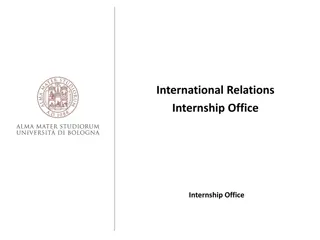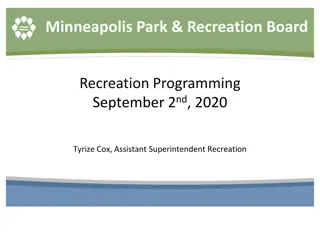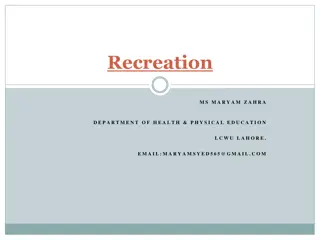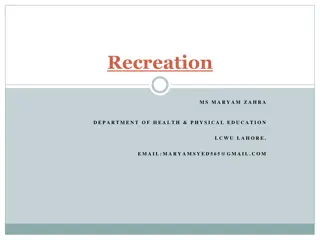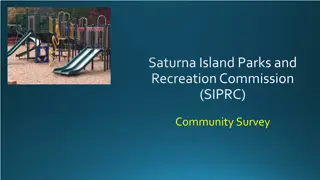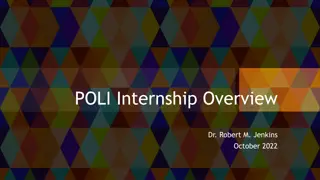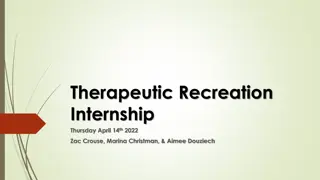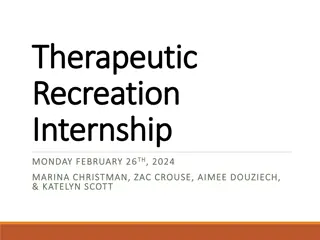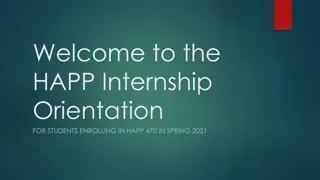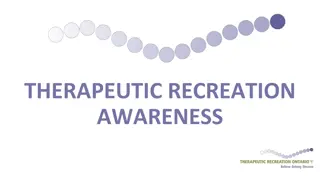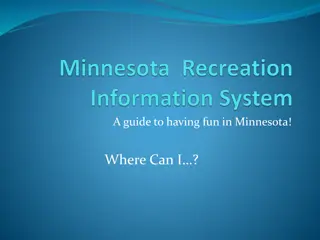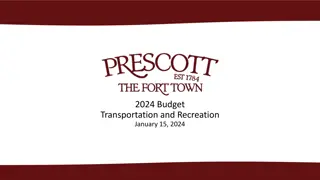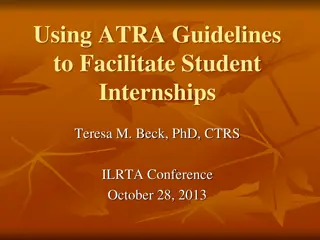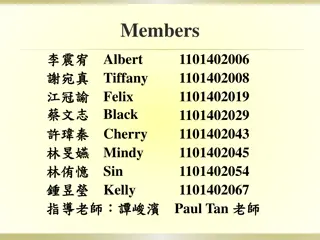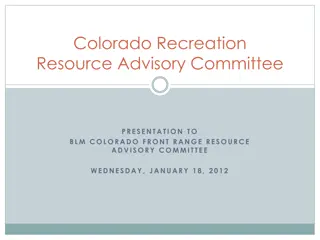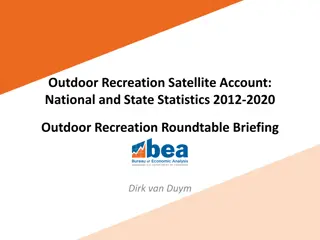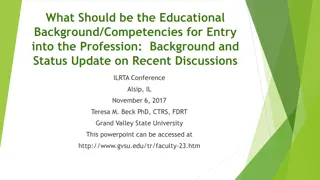Therapeutic Recreation Internship
Essential details for the Therapeutic Recreation Internship on March 25th, 2024, including required documents, potential supervisors, application process, and deadlines. The internship involves various preparations, such as consent forms, immunization records, and police checks. Students will be provided with a list of potential supervisors, and the application process with AHS allows a maximum of 3 submissions per student for Fall 2024 and Winter 2025 internships. Detailed instructions and links are provided for a smooth application process.
Download Presentation

Please find below an Image/Link to download the presentation.
The content on the website is provided AS IS for your information and personal use only. It may not be sold, licensed, or shared on other websites without obtaining consent from the author. Download presentation by click this link. If you encounter any issues during the download, it is possible that the publisher has removed the file from their server.
E N D
Presentation Transcript
Therapeutic Recreation Internship Monday March 25th2024 Aimee Douziech, Marina Christman, Zac Crouse & Katelyn Scott
Agenda Documents required List of potential supervisors Application Process and considerations Internship Preparation and extra information Interviews Conflict Management Sick Time/Time away Navigating potential challenges during placement Accommodations Code of ethics and standards of practice
Documents Required: Faculty of Health Sciences Consent Form HSPnet Consent (for sites that require this for application purposes) Immunization Records Immunization History Form Original Police Information Check (including vulnerable sector search) Moodle Module The Practicum Student Orientation DocuSign Forms the following forms are due 1 week prior to placement start: UofL Informed Consent Risk and Indemnity Agreement UofL Hazard Assessment Any additional forms or documentation as required Forms linked on TREC Practicum Site: https://www.uleth.ca/healthsciences/practicum-therapeutic-recreation
List of Potential supervisors For students completing their internship in the Fall 2024 semester (Sept.- Dec. 2024), we will provide a list of potential supervisors around mid-April (tentatively planned to be available to you on April 18th) For students completing their internship in the Winter 2025 term (Jan.- April 2025), we will provide a list of potential supervisors around mid- August. List of potential supervisors is NOT an exhaustive list. This list is based on supervisors who have expressed interest to us. Most will be based in Alberta with the potential of some in other provinces. You need to do your own research to find the placement you are looking for. Make sure you read the document in full to follow the proper application instructions (including information such as who to make your cover letter out to, etc.). If the proper instructions are not followed, this can impact your application, and in some cases, result in your application not being submitted/considered.
Application Process ***with AHS A maximum of 3 applications per student can be submitted for the first round of applications. The application deadline for the first round of applications is: 12pm (noon) MST Friday, April 26thfor Fall 2024 internships (Sept.-December 2024). 12pm (noon) MST Friday, August 30thfor Winter 2025 internships (Jan.-April 2025). If none are successful, then there will be a second application round approximately: mid to late June 2024 for Fall 2024 internships mid October 2024 for Spring/Winter 2025 internships.
Application Process ***with AHS Resumes and Cover letters for AHS sites need to be submitted to Marina Christman (marina.christman@uleth.ca) by: 12pm (noon) MST Friday, April 26th2024 for the first round of Fall 2024 internships with AHS 12pm (noon) MST Friday, August 30th2024 for the first round of Spring/Winter 2025 internships with AHS AHS Applications must be in PDF format. 1 PDF file per application (cover letter and resume combined) for each site. Be clear in which PDF application belongs to which site. All applications emailed to Marina by the deadline will be submitted to the designated internship sites by Marina through HSPnet. Marina has the only access to this website. Do not contact AHS internship supervisors unless they contact you.
Application Process *** with AHS Generally, you will be informed about 2-4 weeks after the application deadline if you are going to be considered for an interview/internship at any of the AHS sites you applied to. If you are considered for an interview, these will likely take place around 4-8 weeks after your application. For example: If you applied by the April 26thdeadline, you will likely be informed by about mid to late May if you are going to be considered for an interview and then the interview will likely take place around late May to late June. If none of the internship sites you applied for accept you, then you will go through another round of internship applications. This is a common process for students, so don t worry that you didn t make the first round. Please keep Marina informed if you secure an interview
Application Process ***with non-AHS sites Larger organizations similar to AHS, such as Covenant Health, VCH, NSHA, etc., tend to have processes in place similar to AHS. This can mean that you might need to have Marina submit your application on your behalf. For the sites included in our list of sites, details are provided there. If you are looking at another organization not included in out list, check the agency s website for details. Many private organizations allow students to submit their applications directly to the organization. Their deadlines may be more flexible as well. Check their website for details. If you find an organization that you can directly apply to (i.e., we do not have to submit your application for you), please inform us that you have applied to the organization or are planning to. We need to ensure there is an affiliation agreement in place between the U of L and the site. This is not something that can be done last minute. Also, this is important so we can ensure you are receiving the proper communication relevant to your placement.
Application Process (additional information) Although AHS allows a maximum of 3 applications, this doesn t mean that you cannot apply to other organizations. TIP: Only apply to those that you are truly interested in doing your internship with. Once an agency offers you an internship, you need to be timely in giving them a response regarding your acceptance of the placement. You need to be decisive and timely. One week is usually appropriate.
Internship Preparation Register for the course, TREC 4550X, TREC 4550XA, or TREC 4550XB through the Bridge. You must be registered in the course! Note: You may get moved between sections depending on where you end up for your internship. The internship Manual will be posted on the University of Lethbridge TR website for you to review. Please take the time to review this document thoroughly as it includes relevant information for various aspects of your internship. Take the time to familiarize yourself with the assignments, the various forms/agreements, responsibilities, NCTRC job tasks, etc. You are expected to know this manual in detail.
Interviews How to prepare To prepare for the internship interview it s important to rehearse sample questions beforehand and know what kind of questions might be asked during the interview. There is no need to memorize your answers, but you should be able to speak about knowledge areas related to Therapeutic Recreation. Some sample questions may be: What characteristics do you possess that would make you a good candidate? Why did you pick therapeutic recreation as your field of interest? What types of experiences do you have working with diverse populations? What are your strengths? What are areas you could improve on?
Interviews (continued) There may be behavioural scenario questions as well, where the interviewer wants to know how you would deal with hypothetical situations or situations you have dealt with in the past. How would you respond in a conflict situation with a staff member? How have you dealt with conflict with a supervisor in the past? We will get to some specific examples later on.
Interviews Continued Lastly, there may be a case study question that briefly describes a client or patient s history, strengths and weaknesses, needs, interests, etc. Your job is to quickly assess the person and come up with a plan of action. What would a goal be for this person, some programs that would fit their needs and abilities, and how would you assess the effectiveness of your plan?
Case Study example Dorothy is a 58-year-old female who was referred to the TR department following a back injury. Dorothy s back injury occurred two weeks ago as she was lifting her 2- year-old grandson. Other diagnoses are diabetes and obesity. She complains of moderate discomfort in her back when sitting, standing and walking. Also, she describes mild to moderate pain in her feet while standing and walking. Dorothy was assessed by her family physician following her back injury. The diagnosis was back strain , with no significant neurological or disc involvement. She is insulin-dependent and is currently taking Tylenol 1 for pain relief. Dorothy is a divorced mother of one daughter, who is a student and often asks Dorothy to provide child- care for her two-year-old son. Dorothy worked part-time as a store clerk until her diabetes caused her to leave her job 5 years ago; she is now on long-term disability benefits. She lives alone in a main floor apartment and does not own a vehicle. Her daughter and a friend provide transportation for shopping and appointments. Dorothy s leisure interests are sedentary ones. She expressed frustration with being unable to visit friends, attend her weekly social group, and do needlework. Increasing her sitting and walking tolerance was identified as a priority for her quality of life.
Interviews Continued At the end of the interview always have a few questions that you can ask the interviewer. Research the facility and setting, look at their mission and vision, know how many recreation therapists work at the agency and see if any there are any gaps in your understanding. Some sample questions would be: What therapeutic recreation model do you use here? Why? What would the work schedule be? What philosophy or approach to care is implemented? To assist you with knowledge-based questions please review the 2021 NCTRC Job Analysis Knowledge Areas. Questions could be asked about anything related to the knowledge areas, so go through them all and see if you could answer a question related to each item.
Conflict Management *** Often conflict is a result of mis-communication*** How to try and prevent workplace conflict: Communicate, communicate, communicate! Open communication is so important. If unsure about something, then be open to discuss the topic. If there is something bothering you, don t wait for someone else to bring it up or for it to develop into unnecessary conflict you bring it up. Be direct and communicate. Remember that as important as it is to talk, it s also important to listen. Be professional and respectful to others. Remember that it is natural for different people to have differences of opinion respect and acknowledgement of those is important. This doesn t have to result in conflict. In fact, it can result in collaboration!
Conflict Management (continued) If conflict arises anyway: Communicate Be open and listen to what others may be trying to say to you Talk directly to the person who you are having some sort of conflict with, and make sure to hear what they may have to say as well Forgive and move on after the conflict has been addressed holding on will only make the conflict persist
Conflict Resolution Scenarios 1. While discussing your service project with your supervisor, they inform you about a couple options they think you should do, however you disagree and already have an idea that you would like to do for your service project. How do you address this potential conflict? 2. Your internship supervisor has completed your mid-term evaluation. Upon review of it you notice that they didn t mark you what you had expected. How do you prevent this from being a surprise? How do you address this situation after the fact? 3. You are feeling frustrated that you are in week 3 of your internship and you haven t even seen an assessment yet, even though there have been numerous admissions to the unit. How should you address this situation?
Sick Time/Time Away If you have a serious illness or personal emergency causing the absence or the inability to work, you will need to make up these missed hours. The timeframe in which the internship needs to be completed is tight (there is not a lot of flexibility within the term for extending the internship). Do NOT attend your placement if you are ill, please follow your agencies policy regarding this and communicate with your site supervisor. If you are ill and unable to attend your placement for more than a couple of days, you need to contact your academic supervisor to discuss your situation. Vacations, weddings, etc. are NOT to be planned during the internship.
What to do if you are struggling during your internship? Don t sit back and wait for it to pass! Take initiative to overcome the struggles you may be experiencing For example, if you are feeling challenged with assessments, you may need to spend time outside of your internship hours reviewing your notes on assessments or practicing your assessment skills with family and friends. Talk to you site supervisor (supervisors cannot read your mind) For example, if you are struggling with your assessment skills and feel that more observations would be helpful, talk to your supervisor about that. Talk to your academic supervisor/instructor For example, if you continue to struggle with your assessment skills, maybe your instructor can provide tips or suggestions. ***If you wait to communicate your needs, it s harder to support you. As such, take the initiative to communicate with your supports sooner than later.
Accommodations? Talk to the Accommodated Learning Centre regarding potential placement specific accommodations. Placement Specific Accommodations | University of Lethbridge (ulethbridge.ca) Keep in mind, each health organization may have certain processes in place regarding potential accommodations and what they can or can t accommodate. You may find it beneficial to discuss this with your placement site. You may also find it helpful to discuss any anticipated challenges with the internship coordinator who may be able to provide some general guidance. This is NOT required of you. Accommodations can be complex; the more pro-active students are the better. This includes communicating and discussing this well in advance!
Code of Ethics ATRA (2021) The Recreation Therapist commits to four core values: Respect: Recreation therapists shall demonstrate respect by exhibiting due regard for the feelings, wishes, rights, and traditions of others in each of their interactions with clients, colleagues, support systems, and all others in a professional manner. Integrity: Recreation therapists shall demonstrate integrity by having strong moral principles and engaging in honest, equitable, and fair interactions. Competence: Recreation therapists shall achieve high standards of competence. Non-Maleficence: The duty to do no harm and protect others from harm. Recreation therapists shall demonstrate avoiding the causation of harm. For further details on how to carry out and apply these core values, please refer to the ATRA code of ethics webpage: Alberta Therapeutic Recreation Association Code of Ethics Canadian Therapeutic Recreation Association (CTRA) Code of Ethics
Standards of Practice CTRA (2023) Comprehensive Program Planning (CPP) Recreation Therapy Clinical Process (APIE-D) Commitment to Clients and Their Well-Being Non-Maleficence and Ethical Practice Safety and Risk Management Professional Responsibility and Accountability Interprofessional Collaboration Professional Growth and Development Please follow this link for further details pertaining to these standards of practice: Standards of Practice for Recreation Therapists & Recreation Therapy Assistants (canadian-tr.org)
Some Final notes All the information is on our website. If you are unsure about something, please refer to the website first. For some of you, you may need to re-watch the recordings of these meeting again and review the provided PowerPoints. The various documents are also provided on the website. The internship process is STUDENT driven. You need to take the reigns of your internship and ensure you are keeping up to date with requirements, applications, etc. Ultimately you are responsible to ensure you meet all UofL and Agency requirements if you need support or have questions please reach out. If you have questions that you cannot find the answer to on the website, please contact us: For questions related to documentation and applications contact Marina For general questions/information about the internship or for general guidance contact Aimee Timely communication with us (Aimee and Marina) is vital to this process. If we reach out to you for information, you need to respond to us.
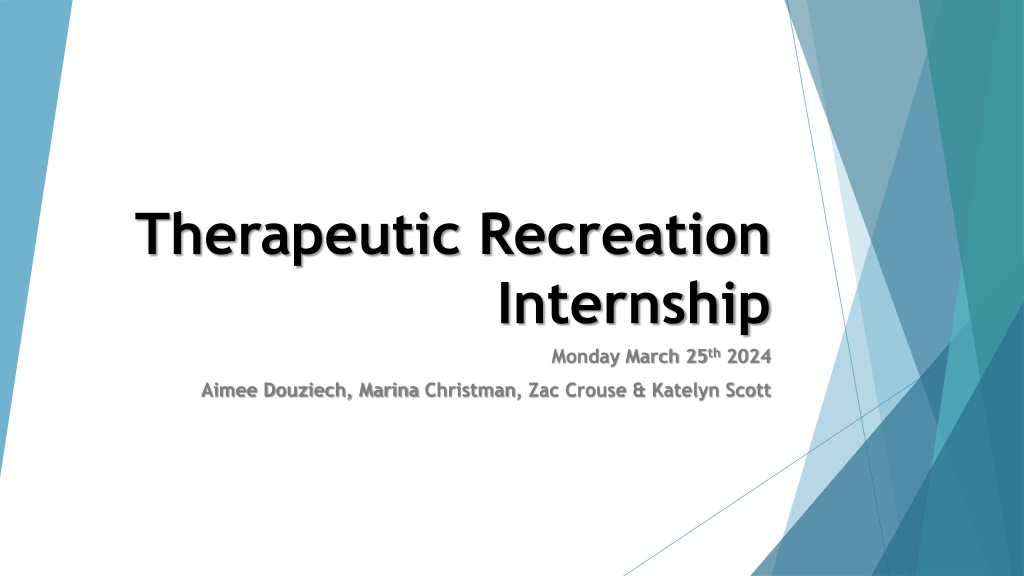
 undefined
undefined




